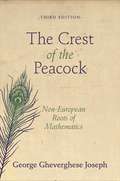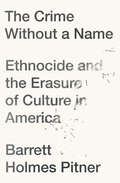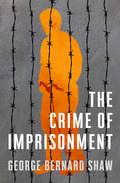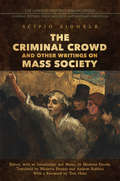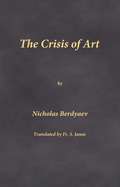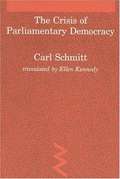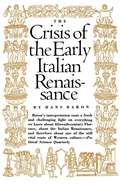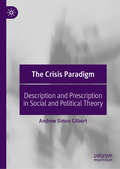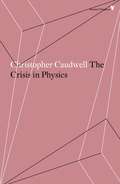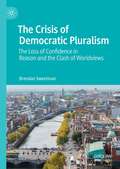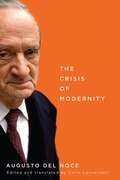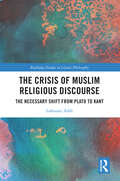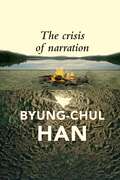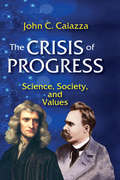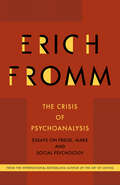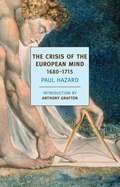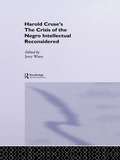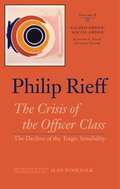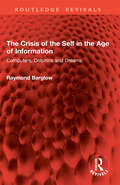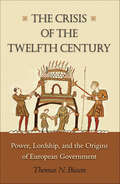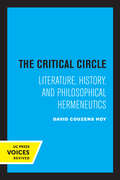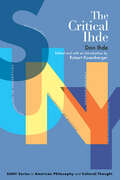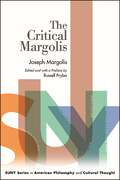- Table View
- List View
The Crest of the Peacock
by George Gheverghese JosephFrom the Ishango Bone of central Africa and the Inca quipu of South America to the dawn of modern mathematics, The Crest of the Peacock makes it clear that human beings everywhere have been capable of advanced and innovative mathematical thinking. George Gheverghese Joseph takes us on a breathtaking multicultural tour of the roots and shoots of non-European mathematics. He shows us the deep influence that the Egyptians and Babylonians had on the Greeks, the Arabs' major creative contributions, and the astounding range of successes of the great civilizations of India and China. The third edition emphasizes the dialogue between civilizations, and further explores how mathematical ideas were transmitted from East to West. The book's scope is now even wider, incorporating recent findings on the history of mathematics in China, India, and early Islamic civilizations as well as Egypt and Mesopotamia. With more detailed coverage of proto-mathematics and the origins of trigonometry and infinity in the East, The Crest of the Peacock further illuminates the global history of mathematics.
The Crime Without a Name: Ethnocide and the Erasure of Culture in America
by Barrett Holmes PitnerIn this incisive blend of personal narrative and philosophical inquiry, journalist and activist Barrett Holmes Pitner seeks a new way to talk about racism in America.Can new language reshape our understanding of the past and expand the possibilities of the future? The Crime Without a Name follows Pitner&’s journey to identify and remedy the linguistic void in how we discuss race and culture in the United States. Ethnocide, first coined in 1944 by Jewish exile Raphael Lemkin (who also coined the term "genocide"), describes the systemic erasure of a people&’s ancestral culture. For Black Americans, who have endured this atrocity for generations, this erasure dates back to the transatlantic slave trade and reached new resonance in a post-Trump world. Just as the concept of genocide radically reshaped our perception of human rights in the twentieth century, reframing discussions about race and culture in terms of ethnocide can change the way we understand our diverse and rapidly evolving racial and political climate in a time of increased visibility around police brutality and systemic racism. The Crime Without a Name traces the historical origins of ethnocide in the United States, examines the personal, lived consequences of existing within an ongoing erasure, and offers ways for readers to combat and overcome our country&’s ethnocidal foundation.
The Crime of Imprisonment
by George Bernard ShawThe Nobel Prize–winning social critic examines the absurdities and moral indignities of modern incarceration in this classic work. Best known for his theatrical works of biting social satire, George Bernard Shaw was also a committed political activist who, at various times, found himself in conflict with the law. Though he was never arrested, Shaw was deeply concerned with the experience of imprisonment and its debilitating effects on inmates. In this polemical study of the contemporary prison system, Shaw dismantles many of the standard arguments for harsh prison sentences. He argues that the impulse for retribution is at odds with the goal of reform, and that prison often fosters greater criminality rather than acting as a deterrent.
The Criminal Crowd and Other Writings on Mass Society (Lorenzo Da Ponte Italian Library)
by Tom Huhn Nicoletta Pireddu Scipio SigheleThe Criminal Crowd and Other Writings on Mass Society is the first English collection of writings by Italian jurist, sociologist, cultural and literary critic Scipio Sighele. Sighele is largely responsible for providing post-unification Italy with a new outlook on issues ranging from the blurring line between individual and collective accountability, the role of urbanization in the development of criminality, and the emancipation of women. This work draws a multifaceted portrait of a provocative thinker and public intellectual caught between tradition and modernity during the European fin de siècle. Containing a comprehensive introduction by the editor, The Criminal Crowd and Other Writings on Mass Society includes Sighele’s seminal work, The Criminal Crowd, as well as his formative studies on group behaviour. Nicoletta Pireddu contextualizes Sighele’s contribution to the so-called ‘age-of crowds,’ from the fierce polemic with his French rivals Gustave LeBon and Gabriel Tarde to the scientific, literary, and cultural developments of his conceptualization of mass behaviours as a legitimate object of psychological investigation into a new century.
The Crisis Of Art
by Nicholas Berdyaev S. Janos1st English translation from the Russian: "The Crisis of Art," an insightful booklet of 47 pages by the Russian religious philosopher Nicholas Berdyaev in 1918, originally comprised 3 articles. The present English text has been expanded into 9 related articles written by Berdyaev during this period, arranged into a threefold triadic schema. The 1st triad of articles in the present text are those contained in the original 1918 Russian text. The cover article, "The Crisis of Art," serving also as title to the booklet, examines cultural trends in art, both visual and literary, such as Symbolism, Decadentism, Cubism, Futurism (Filippo Marinetti) with mention of now obscure figures as Chiurlenis. Both "Picasso" visually and A. Bely's 1916 "Peterburg" novel give expression to the disintegrative features of the modern consciousness. The second triad of articles concern the Russian cultural figure, Vyacheslav Ivanov, mentioned in the initial article, concerning the lost aspect of "theurgy" in art, and attempts to recapture this in light of Nietzsche's Dionysianism. A "culture" as such in its dynamic youthful origins developes from within the "cultus," the "religious cult," and later ossifies losing its vitality. But such attempts at recapturing this initial experience typically prove artificial, prove to be mere "affectations of culture," of the genuine "experience," in Berdyaev's critique of Vyach. Ivanov. The third triad of articles further addresses this defect. The article on A. Bely's 1910 novel, "The Silver Dove," is a chilling account of a member of the Russian intelligentsia, intellectually very sophisticated but empty of soul and bearing, becoming involved with a Russian Khlysty-like sect, "the Doves." The second article, written abroad in 1923, addresses A. Bely's reminiscences of the Russian poet Aleksandr Blok (died 1921), and a failure at a "discerning of spirits" among the cultural element. The final Berdyaev article, on the obscure French Catholic figure Léon Bloy (died 1917), is the most engagingly unique in our text. Written in 1914, for nearly a century until 2005, this was the only source written in Russian on L. Bloy, and nigh impossible to find, but a treasure to peruse. Bloy is in ways considered final representative of a decadentist French literary cultural trend, whose names are unfamiliar to most. But L. Bloy is characteristic of no trend, nor would any trend be comfortable having him. Roughly contemporary to Nietzsche, he bears similarities with Nietzsche, but whereas Nietzsche retreated into lofty isolation, L. Bloy took the "low road" into the bourgeois muck of life. He is a man obsessed with the Absolute, with the "existential man," with the unrepeatable unique fate and destiny of each person, concerning which it is only for God to judge. At first impression he provokes and repels, he is an irascible and impossible fellow, an obsessive with uncouth words and mannerisms. But on second thought, as Berdyaev notes, he is typical of the Russian "holy fools" of old, and we come to feel fascination that we have encountered the perspicacity of a seer. He is a man at the extreme, one relying on no tomorrow or the day after, and his obsession at times borders on the demonic, as Berdyaev notes, requiring a "discerning of spirits." His intuition of the "aloneness" of both God and the individual person is unique. Bloy's critique of the "bourgeois" is not the typical socio-political label of ideologues, but a pervasively profound "metaphysics of bourgeoisness." Léon Bloy richly deserves further study as a significant French Catholic personalist and existentialist philosophic figure, which Berdyaev's article invites. The 10th article appended in our text was not penned by Berdyaev; rather, it suggests the threefold triadic structure to our text, symbolically. The present book is part of a continuing series of works of Russian religious philosophy in 1st English translation.
The Crisis Of Parliamentary Democracy
by Ellen Kennedy Carl Schmitt Thomas McCarthyThe Crisis of Parliamentary Democracy offers a powerful criticism of the inconsistencies of representative democracy. <p><p> Described both as "the Hobbes of our age" and as "the philosophical godfather of Nazism," Carl Schmitt was a brilliant and controversial political theorist whose doctrine of political leadership and critique of liberal democratic ideals distinguish him as one of the most original contributors to modern political theory. The Crisis of Parliamentary Democracy offers a powerful criticism of the inconsistencies of representative democracy. <p> First published in 1923, it has often been viewed as an attempt to destroy parliamentarism; in fact, it was Schmitt's attempt to defend the Weimar constitution. The introduction to this new translation places the book in proper historical context and provides a useful guide to several aspects of Weimar political culture. The Crisis of Parliamentary Democracy is included in the series Studies in Contemporary German Social Thought, edited by Thomas McCarthy.
The Crisis Of The Early Italian Renaissance
by Hans BaronHans Baron was one of the many great German émigré scholars whose work Princeton brought into the Anglo-American world. His Crisis of the Early Italian Renaissance has provoked more discussion and inspired more research than any other twentieth-century study of the Italian Renaissance. <p><p> Baron's book was the first historical synthesis of politics and humanism at that momentous critical juncture when Italy passed from medievalism to the thought of the Renaissance. Baron, unlike his peers, married culture and politics; he contended that to truly understand the Renaissance one must understand the rise of humanism within the political context of the day. This marked a significant departure for the field and one that changed the direction of Renaissance studies. Moreover, Baron's book was one of the first major attempts of any sort to ground intellectual history in a fully realized historical context and thus stands at the very origins of the interdisciplinary approach that is now the core of Renaissance studies. <p> Baron's analysis of the forces that changed life and thought in fifteenth-century Italy was widely reviewed domestically and internationally, and scholars quickly noted that the book "will henceforth be the starting point for any general discussion of the early Renaissance." The Times Literary Supplement called it "a model of the kind of intensive study on which all understanding of cultural process must rest." First published in 1955 in two volumes, the work was reissued in a one-volume Princeton edition in 1966.
The Crisis Paradigm: Description and Prescription in Social and Political Theory
by Andrew Simon GilbertThis book examines how 20th century theorists have used a discourse of “crisis” to frame their conceptualizations of modernity. Through an investigation of four key thinkers (Georg Lukács, Hannah Arendt, Reinhart Koselleck and Jürgen Habermas), Gilbert argues that scholars in the social sciences and humanities should be cautious of treating crises as explananda for research. Instead, the book calls for sociological analysis of the role of “crisis” within social scientific discourse, and examines how “crisis” has been used as a conceptual frame for legitimating theoretical agendas. Gilbert’s “sociology of concepts” approach presents crisis as a paradigm of modern thought, and, more generally, reflects on how concepts can become the carriers of diverse intellectual traditions and debates. The Crisis Paradigm will be of interest to students and scholars of social and critical theory, politics, sociology and history, as well as those working in the fields of media studies, communication and discourse analysis.
The Crisis in Physics
by Christopher CaudwellCaudwell’s controversial book offers an astute and enduring diagnosis of the maladies of bourgeois epistemology.
The Crisis of Democratic Pluralism: The Loss of Confidence in Reason and the Clash of Worldviews
by Brendan SweetmanThis book argues that contemporary liberal democracy is reaching a crisis. Brendan Sweetman contends that this crisis arises from a contentious pluralism involving the rise of incommensurable worldviews that emerge out of the absolutizing of freedom over time in a democratic setting. This clash of worldviews is further complicated by a loss of confidence in reason and by the practical failure of public discourse. A contributory factor is the growing worldview of secularism which needs to be distinguished from both the process of secularization and the concept of the secular state. After describing the crisis, and exploring these themes, and also rejecting proposed solutions from recent liberal political theory, Sweetman develops an approach to pluralist disagreement which requires a re-envisioning of the relationship between religion, secularism and politics, and which allows a limited place for all worldviews in the state, including religious worldviews. Engaging with the work of Philip Kitcher, Robert Audi, John Rawls, A.C. Grayling, Martin Luther King, Cécile Laborde, John Stuart Mill, John Locke, and Plato, Sweetman's approach is a formidable innovation in the quest to maintain a free and fair society.
The Crisis of Global Modernity
by Prasenjit DuaraIn this major new study, Prasenjit Duara expands his influential theoretical framework to present circulatory, transnational histories as an alternative to nationalist history. Duara argues that the present day is defined by the intersection of three global changes: the rise of non-western powers, the crisis of environmental sustainability and the loss of authoritative sources of what he terms transcendence - the ideals, principles and ethics once found in religions or political ideologies. The physical salvation of the world is becoming - and must become - the transcendent goal of our times, but this goal must transcend national sovereignty if it is to succeed. Duara suggests that a viable foundation for sustainability might be found in the traditions of Asia, which offer different ways of understanding the relationship between the personal, ecological and universal. These traditions must be understood through the ways they have circulated and converged with contemporary developments.
The Crisis of Modernity
by Augusto Del Noce Carlo LancellottiIn his native Italy Augusto Del Noce is regarded as one of the preeminent political thinkers and philosophers of the period after the Second World War. The Crisis of Modernity makes available for the first time in English a selection of Del Noce's essays and lectures on the cultural history of the twentieth century. Del Noce maintained that twentieth-century history must be understood specifically as a philosophical history, because Western culture was profoundly affected by the major philosophies of the previous century such as idealism, Marxism, and positivism. Such philosophies became the secular, neo-gnostic surrogate of Christianity for the European educated classes after the French Revolution, and the next century put them to the practical test, bringing to light their ultimate and necessary consequences. One of the first thinkers to recognize the failure of Marxism, Del Noce posited that this failure set the stage for a new secular, technocratic society that had taken up Marx's historical materialism and atheism while rejecting his revolutionary doctrine. Displaying Del Noce's rare ability to reconstruct intellectual genealogies and to expose the deep metaphysical premises of social and political movements, The Crisis of Modernity presents an original reading of secularization, scientism, the sexual revolution, and the history of modern Western culture.
The Crisis of Modernity (McGill-Queen's Studies in the History of Ideas #107)
by Carlo Lancellotti Augusto Del NoceA selection of essays on modernity and secularization by one of the most distinguished Italian thinkers of the mid-twentieth century.
The Crisis of Muslim Religious Discourse: The Necessary Shift from Plato to Kant (Routledge Studies in Islamic Philosophy)
by Lahouari AddiShowing that Muslim societies are facing a crisis that is more cultural than religious, this book focuses on cultural representations through which social life is experienced in the Muslim world. It brings a new theoretical framework to address the secularization process that is underway and the contradictions it entails. This volume will arouse a new debate on secularization and the relations between religion, culture and philosophy. The crisis Muslim societies are undergoing pertains to the culture and not to the Qur’an to the extent that people do not have access to the sacred in itself but only for oneself, meaning a cultural interpretation of the sacred. The Qur’an in itself is not an obstacle to secularization and modernization since any sacred text is experienced through culture. If we consider the European experience where secularization has first emerged, we see that culture has been transformed from medieval metaphysics to modern philosophy upholding a civic culture. Discussing secularization through cultural representation, this book launches new ideas that fill an important gap in the literature on secularization. It is a key resource for any readers interested in religious studies, philosophy and the anthropology of religion.
The Crisis of Narration
by Byung-Chul HanNarratives produce the ties that bind us. They create community, eliminate contingency and anchor us in being. And yet in our contemporary information society, where everything has become arbitrary and random, storytelling becomes storyselling and narratives lose their binding force. Whereas narratives create community, storytelling brings forth only a fleeting community – the community of consumers. No amount of storytelling could recreate the fire around which humans gather to tell each other stories. That fire has long since burnt out. It has been replaced by the digital screen, which separates people rather than bringing them together. Through storytelling, capitalism appropriates narrative: stories sell. They are no longer a medium of shared experience. The inflation of storytelling betrays a need to cope with contingency, but storytelling is unable to transform the information society back into a stable narrative community. Rather, storytelling as storyselling is a pathological phenomenon of our age. Byung-Chul Han, one of the most perceptive cultural theorists of contemporary society, dissects this crisis with exceptional insight and flair.
The Crisis of Progress: Science, Society, and Values
by John C. CaiazzaThis book is about the concept of progress, its separate varieties, its current rejection, and how it may be reconsidered from a philosophical and scientific basis. John C. Caiazza's main emphasis is on how science is understood as it has a direct impact on social values as expressed by prominent philosophers. He argues that progress is at a standstill, which presents a crisis for Western civilization.Caiazza presents historical examples, both of scientific inquiry and social and cultural themes, to examine the subject of progress. Beginning with the Whig model and progressive political values exemplified by Bacon and Dewey, he also examines other variations, the Enlightenment, cosmopolitanism, and totalitarianism. Technology, argues Caiazza, also has a stultifying effect on Western culture and to understand the idea of progress, we must take a philosophic rather than a scientific point of view. Modern cosmology has inevitable humanistic and theological implications, and major contemporary philosophers reject social science in favour of ancient concepts of virtue and ethics.In the end, Caiazza writes that time is an agent, not a neutral plain on which scientific and historical events occur. We can expect technology to keep us in stasis or become aware of the possibility of transcendence. This book will be of interest for students of scientific history and philosophy.
The Crisis of Psychoanalysis: Essays on Freud, Marx and Social Psychology
by Erich Fromm&“This book is must reading . . . although it will at times shock and perhaps even offend the sensibilities of traditional therapists.&” —American Journal of Psychiatry This book brings together Erich Fromm&’s basic statements on the application of psychoanalytic theory to social dynamics. At the same time, it offers an image of man consonant with the hopes of radical humanism.The Crisis of Psychoanalysis is a collection of nine brilliant essays. Although his work is deeply rooted in Freudian theory, Fromm further develops Freud&’s doctrines by including both social and ethical dimensions, and applies his discoveries and insights to address the problems we face in society at large. &“This collection is a fine representative sampling from a lucid, humane, always attractive writer.&” —Kirkus Reviews &“Highly recommended.&” —Library Journal
The Crisis of the European Mind: 1680-1715
by Anthony Grafton J. Lewis May Paul HazardPaul Hazard's magisterial, widely influential, and beloved intellectual history offers an unforgettable account of the birth of the modern European mind in all its dynamic, inquiring, and uncertain glory. Beginning his story in the latter half of the seventeenth century, while also looking back to the Renaissance and forward to the future, Hazard traces the process by which new developmentsin the sciences, arts, philosophy, and philology came to undermine the stable foundations of the classical world, with its commitment to tradition, stability, proportion, and settled usage. Hazard shows how travelers' tales and archaeological investigation widened European awareness and acceptance of cultural difference; how the radical rationalism of Spinoza and Richard Simon's new historical exegesis of the Bible called into question the revealed truths of religion; how the Huguenot Pierre Bayle's critical dictionary of ideas paved the way for Voltaire and the Enlightenment, even as the empiricism of Locke encouraged a new attention to sensory experience that led to Rousseau and romanticism. Hazard's range of knowledge is vast, and whether the subject is operas, excavations, or scientific experiments his brilliant style and powers of description bring to life the thinkers who thought up the modern world.
The Crisis of the Negro Intellectual Reconsidered: A Retrospective
by Jerry WattsThirty-five years after its initial publication, Harold Cruse's "The Crisis of the Negro Intellectual," remains a foundational work in Afro-American Studies and American Cultural Studies. Published during a highly contentious moment in Afro-American political life, "The Crisis of the Negro Intellectual" was one of the very few texts that treated Afro-American intellectuals as intellectually significant. The essays contained in Harold Cruse's "The Crisis of the Negro Intellectual Reconsidered" are collectively a testimony to the continuing significance of this polemical call to arms for black intellectuals. Each scholar featured in this book has chosen to discuss specific arguments made by Cruse. While some have utilized Cruse's arguments to launch broader discussions of various issues pertaining to Afro-American intellectuals, and others have contributed discussions on intellectual issues completely ignored by Cruse, all hope to pay homage to a thinker worthy of continual reconsideration.
The Crisis of the Officer Class: The Decline of the Tragic Sensibility (Sacred Order/Social Order #2)
by Philip Rieff<p>Philip Rieff earned recognition as one of the most profound social theorists of culture and authority of the twentieth century. Through such works as Freud: The Mind of the Moralist and The Triumph of the Therapeutic, he proved himself an incisive interpreter of Freud and his legacy. His work now culminates with the long-awaited trilogy, Sacred Order/Social Order, a three-volume work on social theory and contemporary culture. <p>In Volume 2, The Crisis of the Officer Class: The Death of the Tragic Sensibility, Phillip Rieff continues his assault against the deathworks of our modern age. Invoking his theory developed in Volume 1, he develops his critique of our current culture as distinguishable only by its rejection of any and all visions of sacred order.</p>
The Crisis of the Self in the Age of Information: Computers, Dolphins and Dreams (Routledge Revivals)
by Raymond BarglowFirst published in 1994, in The Crisis of the Self in the Age of Information Raymond Barglow shows how contemporary technological environment furnish the unconscious with internal objects that hark back to a time in our lives prior to personal boundary formation and identity. The consequence is that our technological involvements help to disrupt and dismantle the ideal of the unified and sovereign self that in the past technology fostered.Throughout the book Raymond Barglow interweaves critical theory and psychoanalysis with an examination of artistic representations, media imagery and dreams to explore the conflictual dynamics of contemporary self-information and self-representation. This book is an important work for scholars and researchers of philosophy, psychoanalysis, and clinical psychology.
The Crisis of the Twelfth Century: Power, Lordship, and the Origins of European Government
by Thomas N. BissonMedieval civilization came of age in thunderous events like the Norman Conquest and the First Crusade. Power fell into the hands of men who imposed coercive new lordships in quest of nobility. Rethinking a familiar history, Thomas Bisson explores the circumstances that impelled knights, emperors, nobles, and churchmen to infuse lordship with social purpose.Bisson traces the origins of European government to a crisis of lordship and its resolution. King John of England was only the latest and most conspicuous in a gallery of bad lords who dominated the populace instead of ruling it. Yet, it was not so much the oppressed people as their tormentors who were in crisis. The Crisis of the Twelfth Century suggests what these violent people—and the outcries they provoked—contributed to the making of governments in kingdoms, principalities, and towns.
The Critical Circle: Literature, History, and Philosophical Hermeneutics
by David Couzens HoyThe Critical Circle investigates the celebrated hermeneutic circle, especially as it manifests itself in historical inquiry and literary criticism. Formulated variously in different theories of hermeneutics, the circle generally describes how, in the process of understanding an interpretation, part and whole are related in a circular way: in order to understand the while, it is necessary to understand the parts, while to understand the parts it is necessary to have some comprehension of the whole. --from the Foreword This title is part of UC Press's Voices Revived program, which commemorates University of California Press’s mission to seek out and cultivate the brightest minds and give them voice, reach, and impact. Drawing on a backlist dating to 1893, Voices Revived makes high-quality, peer-reviewed scholarship accessible once again using print-on-demand technology. This title was originally published in 1982.
The Critical Ihde: Suny Series In American Philosophy And Cultural Thought (SUNY series in American Philosophy and Cultural Thought)
by Don IhdeDon Ihde is one of the world's foremost thinkers on the place of technologies in our lives. Over the course of a long career, he has built a unique and useful perspective by expanding on phenomenological and American pragmatist philosophy and has developed wide-ranging insights and conceptual tools for describing the details of our experience across the various areas of human activity, including scientific practice, anthropological history, computer interface, design, art history, and the technologies of everyday life. The Critical Ihde brings together many of Ihde's most influential writings, as well as a number of under-recognized gems. Across these works are examples of his influential contributions to the phenomenology of human auditory and visual experience, his foundational work on the phenomenology of technology, and his thoughts on the technologies of scientific practice, including laboratory and medical imaging. Further, these chapters reveal the development of "postphenomenology," Ihde's original philosophical perspective, one that continues to flourish today across the work of a growing interdisciplinary and international collective of scholars.
The Critical Margolis (SUNY series in American Philosophy and Cultural Thought)
by Joseph MargolisPragmatism's revival since 1980 can be credited to several thinkers, among them the longtime professor of philosophy at Temple University, Joseph Margolis. The Critical Margolis collects within one volume more than a dozen of his essential writings, allowing readers to become familiar with his important contributions to core areas of philosophy, where he has controversially challenged scientistic, analytic, and continental traditions. During a period when sharp divides animate intellectual debates—realism or idealism, matter or mind, causality or freedom, machines or persons, facts or values, cognition or emotion, and the like—Margolis dissolves false dichotomies and reconstructs philosophy itself. Prominent philosophers of the second half of the twentieth century, from Quine, Danto, and Putnam to Derrida, Rorty, and Brandom, along with a host of similarly significant thinkers, are targets of Margolis's critiques.If there could be a comprehensive volume of pragmatism for today and tomorrow, The Critical Margolis shall serve.
